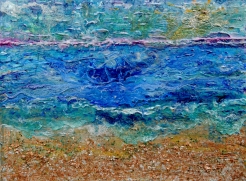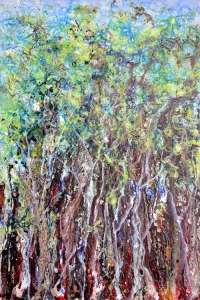Creatives’ On-Going Quest for an Authentic Presence
We homo sapiens are marvels, aren’t we? Since the dawn of our species, through every era, among us have been extraordinarily artistically gifted people. They are blessed or burdened with an unquenchable need to express, to grow, to explore, to create, and to embellish their existence by communicating in their own voice–which is not precisely like any other voice–a presence they wish, rather urgently, to share.
The first subject our artistic forebears chose to leave behind for us to see are impressions of their hands on the walls of caves. There at that site thirty thousand years ago, a man or woman–much shorter than us, with faces different than ours, working alone as artists do–put aside chores, squatted down in darkness, and blew colored pigment through a rod onto their hand, leaving no other trace of their days and nights but that hand. Yet through that hand–that painter’s medium, that subject–we feel their presence, and with it a bond, a caring for them, a love. We hear their voice.
The late composer Marvin Hamlisch–a three-time Academy Award winner, and Pulitzer Prize winner for the composition for the play A Chorus Line–was a friend. Once I told him I’d been watching a movie and a few bars into the music, I knew he had written it. He said, “Is that true?” I said yes, every distinctive piece of music, writing, art, acting, and composing is marked by the recognizable voice of the person who created it.
It is often because of that clear voice that we go on reading the poem, or viewing the painting, or listening to the actor or to the music, and are attentive and respectful. It’s only inferior work that doesn’t take us back to an interesting, stimulating, flexible, and complex mind of the person behind the work. Who a creative is intellectually, emotionally, and spiritually radiates from the creative’s presence in the work and cannot be hidden. Many creatives have recognizable voices because they return again and again to painting or writing about a particular subject matter. Some creatives, such as Welsh poet Dylan Thomas, discovered their authentic voice when they were young; others, such as self-taught American poet Walt Whitman, not until later in life.
So if we’re looking for prescriptions to the creative for finding or authentic voice and presence, the first would be: “Reveal yourself. Let your true identity permeate the work—your sincerity, your honesty, your mind in action, your originality, abilities, and uniqueness, the ‘I’ who you are–for it’s that, above and beyond the other content that your audience will be attracted to. Be interesting, be clever, be skilled, be alive, be true, and be authentic.
Learning to Write In a More Satisfying Voice
American novelist John Hersey said, “The voice is the element over which you have no control.”
Contrary to Hersey’s belief that writers have no control over their voice, they definitely do. Yet many writers have searched their texts for their authentic voice and can’t find it. So they sometimes conclude that while there may be such a thing as a voice, they do not have one, or they might have one but they don’t know what it is, and couldn’t describe it if they were asked to. But their voice is right there in the text, or the right voice can be added to the text. Always be thinking of the voice you want your work to project.
A writer was dissatisfied with the voices she found in her writing. They didn’t seem to be “her.” They were different from what she felt should be the voice of a mature, thirty-five year old mother of two, an assertive, experienced writer of essays and short stories. A few of her stories had been published in a local literary magazine. She hoped to continue writing and seeing her work appear in better magazines. She didn’t like the syntax in her writing. She thought the writing was too formal and stilted, too cold, humorless, bland, business-like, academic, dull, lifeless, and not inviting for readers.
If you have a similar problem, here is an approach you might find helpful: ask experienced writer friends to look through a piece you’ve written. Ask them to identify sentences or passages that sound most like you. Then analyze what they think sounds most like you and identify the salient elements that gave them that impression-when they say, “Right there you were doing something very good. You should get more of that into your writing, you may be onto something.”
Then write a piece in that voice. Then show a draft of the piece to a supportive writer. Ask them what they think. Does it work? If it doesn’t work, write the piece again. If it does sound like you, you’ll be encouraged.
If in your craft you are trying to communicate a particular voice or to avoid communicating another one, you might tell your friends what you would like them to look for as they look at your work. Once when I was working on a book, I left some pages on my desk and went to bed. The next day I noticed my teenage daughter had circled a couple of sentences and written, “Write more like this, Dad. Sounds like you,” and it was my voice loud and clear.
Avoid steering their perceptions in a particular direction, as saying to them, for example, “Is my writing dull?” “Is it too complicated and unclear?” Leave them alone to make their own observations. Be sure to tell them that you want their opinions and that you are giving them your permission to be honest and open.
A competent writer should be able to write in more than one voice, as required by the work at hand, a competent painter to paint in more than one. Who could paint in as many voices as Picasso? But in the creatives’ way of producing works there is one voice that is the most powerful, natural, and suitable to what creatives are trying to accomplish, what author Peter Elbow calls the “juice.” When the quest for an authentic voice is successful, creatives come into their own and do their art better than ever before.
I can’t think of better teachers of voice than writers who have the kind of voice that appeals to you and you would like to learn from. I find the voices of James Agee’s A Death in the Family, Joseph Conrad’s Heart of Darkness, some passages of Thomas Wolfe, Ernest Hemingway’s The Sun Also Rises, and Anton Chekhov’s “The Lady With a Dog,” full of instruction for me as I look for the voice I want, thinking, “I’d like my writing to sound that way consistently.” To better understand how Hemingway created the effects he did, I analyzed his work and read what critics and teachers had to say about it, then wrote an essay on techniques he employed to create his voice. It is a voice that in the 1920s marked the start of the “Hemingway Voice” that revolutionized how, ever since, Americans have written and spoken. Whose voices do you admire most?
The lovely art featured in this post is by Regina Valluzzi, a trained scientist and researcher in the Chemical , Physical, and Biological Sciences. The influence of her scientific experience permeates her approach to painting as both an art and a science, and gives her a unique voice. The pieces she has kindly allowed me to display here, she has informed me, “feature mixed media and a combination of “classic” painting techniques, controlled fluid pouring techniques and acrylic extrusion using cake decorating tools to control the three dimensional line shape and forms. In most cases [she has] developed [her] own techniques or versions of techniques through a variety of controlled experiments.”
© 2018 David J. Rogers
For my interview from the international teleconference with Ben Dean about Fighting to Win, click on the following link:
Order Fighting to Win: Samurai Techniques for Your Work and Life eBook by David J. Rogers
or
Order Waging Business Warfare: Lessons From the Military Masters in Achieving Competitive Superiority
or










I love what you are saying here David and the way you say it, but I’d like to add that within our individuality there is a very common thread, which is especially in music, a standard functional harmonic and melodic progression is where all individual music begins. And, without that, individuality without the connection of standards, one ends up with an empty voice, I know because that’s where I feel my music is at.
LikeLiked by 1 person
Robert, thank you for your comment. You, of coursa, know far more about musical composition than I, but I understand exactly what you mean. You make me think of some ideas from Stravinsky, who believed that without working within the standards–the rules–the composer’s music suffers.
I think that whatever problems with voice you seem to be implying, you will find a solution that pleases you. I wish you luck, particularly in your desire to write music for movies, and art form which I’m much attracted to.
Best wishes,
David
LikeLike
Advice well taken, David. You have a gift for describing voice and the importance of finding it. Thank you!
LikeLiked by 1 person
Janet, thank you for the compliment. The more thinking I do about voice, the more vital to fine craftsmanship I think it is. So I might write more about it. Voice has been called the most vital source of discussion in current writing.
LikeLike
This great, you are using an artist who I know personally. I think it’s wonderful. If you have time check out my new website, especially my artists statement. I’m hoping to get on a roll with my blog soon. Thanks, Nadia Skypainterstudios.com
Sent from my iPhone
>
LikeLiked by 1 person
Nadia, I’m happy to hear from you again, old friend and hope you’re well. You sound well. I’m glad you know the artist. I have never ment Regina, but she does wonderful work, doesn’t she? Of course I adore your magnificent skies. You do wonderful work also.
Your “About” section on your blog is full of poetry and wisdom that is strong and affecting. I especially like your connection of moments in the sky to moments in our thoughts. I think most people have felt that majesty when seeeing the sky that you talk about and that you have the skill to convey in your paintings. I think your paintings are even more beautiful now than they were when I first knew you.
I wish you the very best in your future work and in your blog. Really good blogs are rare, so I have high hopes for yours.
Best wishes,
David
LikeLike
Good morning David…thank you once again for an insightful post. I thought of you recently when I watched a box set entitled ‘Genius:Picasso’. Not only did it bring forth Picasso’s particular issues as a creative but those of the many other artists and people (particularly women) surrounding him. Although clearly made for an audience, it was done well and so much of it rang true to me. I think it’s something you might enjoy.
Thank you again for featuring such lovely artwork. Hope you are enjoying a lovely summer. We are experiencing a heatwave in London….It’s about 85 F which is high heat in this neck of the woods:) Best wishes Janet
LikeLike
Hello Janet. Thank you for your comment and the tip about Genius Picasso. It sounds very good. I enjoy featuring such fine artists in my posts, probably because I am so envious and impressed with their (and your) wonderful talents, and because any kind of artistic beauty–a painting, lovely prose, a skilled actor– fills me with admiration and sheer joy–always has.
Yes, summer has finally arrived here. It is something on the order of your London heat wave, but ten or twelve degrees hotter, which is paradise for sun-loving Diana who swims five times a week year round. It is often extremely humid here too because of our being on the shore of big Lake Michigan, so it can get very uncomfortable. Also heat is appropriate for going to baseball games to see grandchildren play. I have eight such creatures, ranging in age from eighteen to three, three of them talented ball players (2 boys, 1 girl).
Best wishes,
David
LikeLiked by 1 person
Oh my that does sound hot! – but as you say great for Diana and very appropriate for watching little league baseball. I attended a few games myself when living in the States.
I am having quiet days painting with a fan which feels very good. Fortunately my flat/studio is very airy and rarely gets too hot or for that matter cold. It’s a good space to live and work in.
Keep cool and please eat a hot dog for me at the next game.
Best wishes
Janet.
LikeLike
You say you have a fan. My barber Franco tells me that in summer he doesn’t use the air conditioner at all, but only fans, and the house is very cool. I may try that–a money-saver too.
Did you like baseball? For me, the patriarch of the family, and my children and theirs, baseball is the last word. The year seems to start the opening day of the major league baseball season and end when it does. It is so complicated and has so many rules that it is always fascinating.
You say, “Quiet days painting,” and that sounds so pleasant to me. I too am working quietly these days trying to sit back and solve a creative problem, trying to calm a much too active mind and get work done. Well, isn’t that what people like you and me want? To get the work out.
Have a good day and please send good vibes over to me so that my plans become clearer and my productivity increases. I’ll send them back to you, too, okay?
Best wishes
David
LikeLike
Excellent post. It took me many years to find a voice I could be comfortable with–literary fiction felt untouchable and rigid. It took the essays of Diana Wynne Jones to sort me out. 🙂
LikeLiked by 1 person
Jean Lee, Thank you for the compliment. I’m sure settling on your true voice was a major breakthrough in your writing career. I’m convinced that that process and the enlightenment and confidence it brings is essential if writers are to reach their peak performance. Till then, they’ll flounder. Other than these blog posts I do for the fun of them with no interest in making money off them, most of my writing is on a book I’m writing for writers and artists and on personal essays written for magazines and journals. In that book (one voice) and those essays (a different voice) my voice is clear, and I am very aware of it and try to project it.
Thank you for your comment. I hope your creative writing goes very well–and your life too–and you achieve whatever you’re aiming for. I enjoy your posts and can see why they’re popular. They’re well thought out and skillfully written. I think you’ve had good training–from someone else or yourself.
Best wishes
David
LikeLiked by 1 person
Thank you so much for such a kind compliment! I attempted essay writing in graduate school, but rarely pulled it off. Honestly, I think reading more and writing more often in areas I genuinely care about has made all the more difference. 🙂
LikeLike
I’m sure that does make a huge difference. As for my compliment, it’s deserved.
LikeLiked by 1 person
Just perfect. Your thoughts. Your words. Everything, David. I very much enjoyed this article. Thank you.
LikeLike
Thank you, Penny. It’s very kind of you. I’m glad you enjoyed the article. I enjoyed writing it.
Best wishes,
David
LikeLike